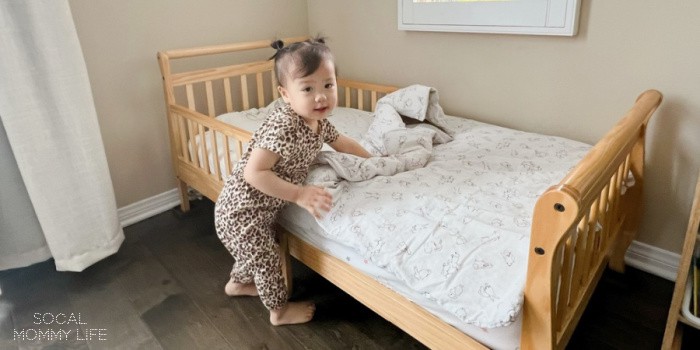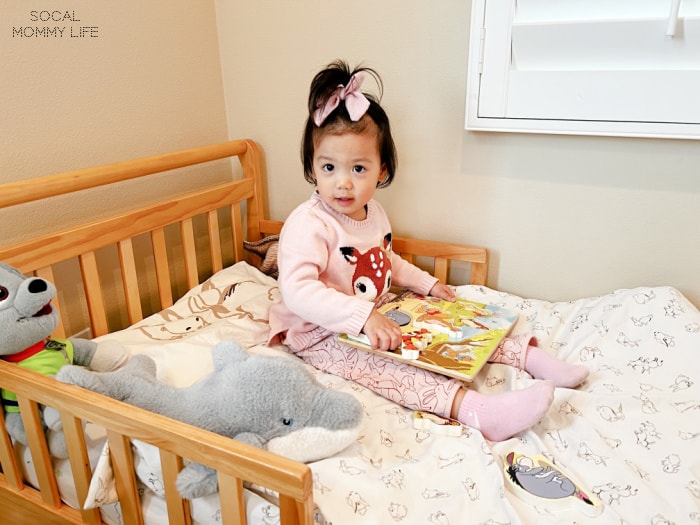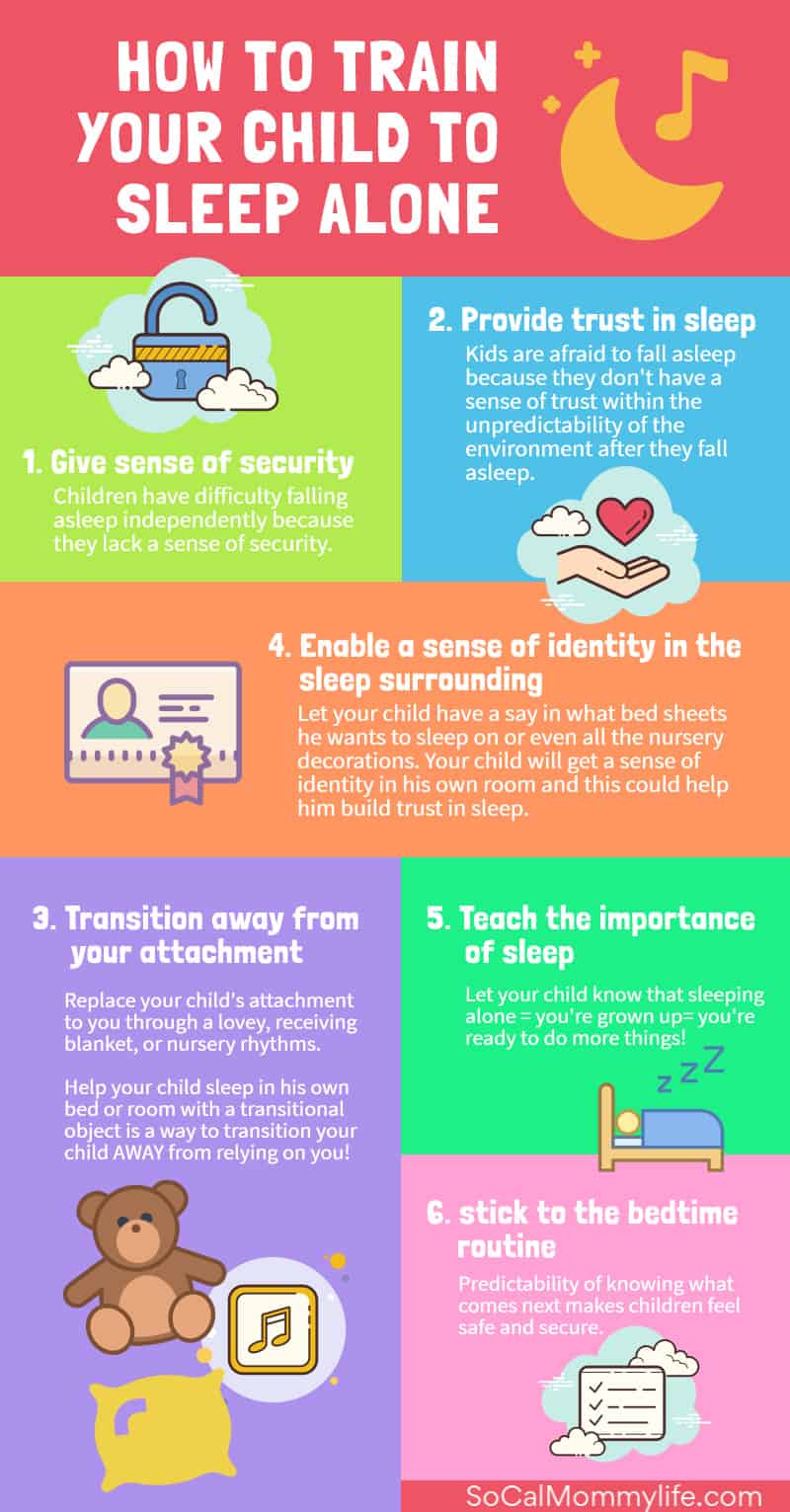Are you struggling to get your child sleep alone and transition away from bed-sharing? Is your child finding tons of excuses to avoid sleeping in her own room?
Learning how to sleep alone is great for children’s development as they learn how to be more independent and not overly rely on their parents.
Children have difficulty falling asleep independently because they lack a sense of security.
Getting your child to successfully transition into sleeping alone can be a challenging undertaking but it is possible.
This post may contain affiliate links, which means I’ll receive a commission if you purchase through my link, at no extra cost to you. Please read full disclosure here.
Here are the proven tips designed specifically for parents who struggle to get their kids settled into a regular independent sleeping routine.
1. Establish a bedtime routine and stick with it
One of the best ways to help your child sleep alone is to establish a bedtime routine. A bedtime routine should include activities such as taking a bath, brushing teeth and reading a book. Doing these activities every night will signal to your child that it is time to go to sleep.
With both of my babes, we established our bedtime routine from day 1. Even when they were just a couple of months old, we did the same routine every day, without fail. Our bedtime routine consists of brushing our teeth, taking a bath, reading a book, and saying nighty-night. After we finished reading books (one for big brother and another for little sister), my kids would put the books on their bookshelf and hop onto their beds.
2. Make sure the bedroom is dark and quiet
Another way to help your child sleep alone is to make sure the bedroom is dark and quiet. This means closing the blinds or curtains and turning off any electronics that may emit light or noise. Creating a calm environment will help your child relax and fall asleep more easily.
These beautiful embroidery curtains are the ones we have for the kids’ bedroom. It not only does the job but I have received so many compliments on them.
RELATED POST: 14 Sleep Training Essentials To Get Your Child Sleep Trained Fast
3. Give your child the power to choose
Kids are afraid to fall asleep because they don’t have a sense of trust in the unpredictability of the environment after they fall asleep. To help your child establish trust in sleep, give them the power to choose.
Let your child choose which teddy bear to cuddle with to bed, let him choose which books to read before bed, and which pajamas to wear. If you have a bedtime routine, let him choose which activities to do… you get the idea.
4. Give your child a sense of identity in their sleep surrounding
Let your child have a say in what bed sheets he wants to sleep on or even all the nursery decorations. Your child will get a sense of identity in his own room and this could help him build trust in sleep. Before bed, you can tell your child to “go find your friend Micky (referring to the Micky Mouse printed bedsheets) or “Princesses Elsa is calling you for bed (for an Elsa sleep pillow)”. This technique can help distract your child from the unpredictability he feels after lights off.
Be courageous and playful, and let your child know that going to bed is not scary at all.
5. Teach your child the importance of sleep
As your child grows and starts to make a connection between ideas, it’s important to teach your child the importance of sleep. It’s important to give your child their sense of mission in sleep.
Let your child know that sleeping alone = you’re grown up and you’re ready to do more things!
Tell your child sleeping together is for little babies. Sleeping alone will make her fall asleep faster, and falling asleep faster will make her grow taller and healthier.
If they don’t have a sense of mission in sleep and they are being forced to sleep alone, they will not nurture the ability to fall asleep independently.
6. Keep toys out of the bed
If your child sleeps with toys that he normally plays with during the day, you may want to keep them out of the bed during the night. This will help your child associate the bed with sleep, not playtime.
Sometimes, my kids would play with toys in their bed but I always ask them to clean up before our bedtime routine starts. They know that the only thing allowed on their bed is their stuffed animals that they cuddle to sleep with.
7. Give your child a security object
If your child is having trouble sleeping alone, you might want to give them a security object such as a stuffed animal or blanket. This can help your child feel more comfortable and safe when they are in their room by themselves.
8. Avoid screentime right before bed
Avoiding screen time right before bed is essential. Blue light emitted from screens can impact sleepiness and make training tougher. You want your child to feel sleepy, as this makes it a lot easier for them to know when sleep time is coming so they can get in the habit of falling asleep by themselves.
9. Don’t stay in the room until they fall asleep
Once you have checked on your child and said goodnight, it’s important to leave the room so they can fall asleep on their own. If you stay in the room, they may start to think that they need you in order to fall asleep, which can make it harder for them to sleep alone in the future.
10. Assure your child that you are not going away
After you put your child in her own room, let her know that mommy and daddy are just outside. You can say something like “You go in and sleep. You know where to find us if you need us”.
On the first night, most kids will refuse to sleep alone or that they come to find you shortly after you leave the room. If this happens, you can take another approach and say “ok, go in first and tuck yourself in your bed. We will go find you after a while”. Then, progressively increase the length you go in. Progressively letting your child fall asleep alone is the best way to establish trust in sleep.
11. Set limits on how often you check on your child
It’s important to let your child know that you are nearby, but you don’t want to check on them too often. Checking on them too often can actually make it harder for them to sleep alone. Instead, set limits on how often you will check on them and stick to those limits.
12. Reward good behavior
If your child spends a night sleeping in their own bed without coming to find you, be sure to praise them for their good behavior! This will help encourage them to keep up the good work. You can give them a small prize or treat as a reward for sleeping in their own bed all night long.
13. Don’t punish bad behavior
On the other hand, punishment is not an effective way to get your child to sleep alone. If they come into your room during the night, simply guide them back to their own bed without yelling or scolding them. Yelling or punishing them will only make it harder for them to sleep alone and could cause them to be even more afraid of sleeping in their own bed
FAQ on helping your child sleep alone
Is it healthy for kids to sleep alone?
While some parents may prefer to keep their kids in the same bedroom as them, research suggests that allowing kids to sleep alone can lead to better sleep quality overall. This is because children will be able to sleep longer uninterrupted periods without interference from others and can foster independence. Of course, safety is an important factor to consider when sending young ones to bed alone; familiarizing them with the home environment can help ease any anxieties they may have. Ultimately, it’s up to the individual family to decide what arrangement works best for them.
At what age should a child stop sleeping with their mother?
A child should start practicing sleep habits such as developing their own sleep space in order to receive all the benefits sleep has to offer. This usually means that by the age of 3 or 4, a child should move out of mom’s bed and begin sleeping alone. Of course, this transition does not have to happen overnight – you can start off by setting up your child’s bed in the same room as yours with incremental steps towards complete autonomy. Doing so will help ensure your child can get the sleep they need – plus, teach valuable sleep habits that will stay with them for years to come.
Getting your child to sleep alone can be a challenging task, but with some guidance and patience, it can be achieved. With enough practice and consistent sleep habits over time, your child will soon become a seasoned solo sleeper!
Train your child sleep alone related posts
- 14 Sleep Training Essentials You Didn’t Know You Needed
- 5 Proven Tips to Get Your Baby Sleep Trained Fast
- The Only Ferber Method Guide You’ll Need To Successfully Sleep Train Your Baby
This post was all about how to teach your child sleep alone.
Save these pins now ![]()









3 comments
These are such great tips! Based on love more than anything, which is the way to go!
Great tips, I actually will need to do this very soon now!
Great tips, thank you for sharing to all of us!